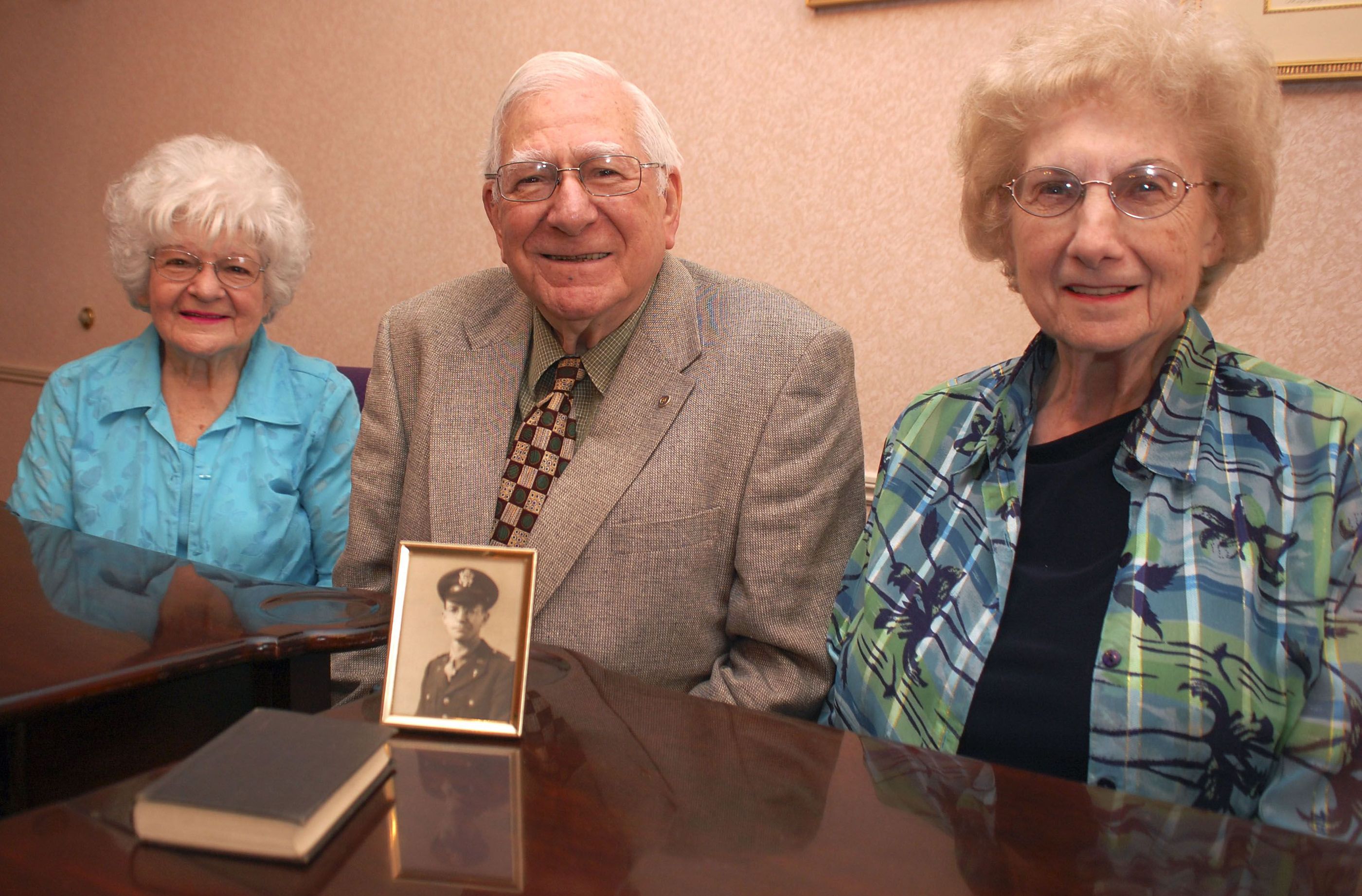Wineka column: Fisher family still has German Bible signed by Nazi defendants at Nuremberg Trial
Published 12:00 am Friday, August 15, 2014
SALISBURY — When he was 7 years old and listening to the radio about the German war machine’s march through Europe, Carl Fisher turned to his father and said, “Let’s send Hitler a Bible.”
“When you’re young,” Fisher says today, “you have a lot of faith.”
Fisher had no way of knowing then, but his father, a Lutheran minister and Rowan County native, would someday be responsible for delivering Bibles not to Adolf Hitler, but to some of his most notable disciples as they stood trial in Nuremberg, Germany, after World War II.
In 1942, the Rev. Roy L. Fisher, by then a longtime pastor in Davidson County, volunteered for the Army. It meant leaving behind his wife, Ethel, and their four children, Roselyn, Jean, Carl and Marjorie.
Roy Fisher took his chaplain’s training at Harvard University and wound up being sent to the European Theater. He was in England during the Blitz, then served as chaplain at field hospitals throughout the Allied campaign in Europe.
After the war, the Army posted him at the 120th Station Hospital in Bayreuth, Germany.
Meanwhile, as the International Military Tribunal convened to prosecute political and military leaders of the Third Reich in Nuremberg, fellow chaplain Henry Gerecke asked Fisher for help.
Fluent in German, Gerecke had been assigned as chaplain to the Nazis on trial — a thankless position. According to Frederick Grossmith’s book, “The Cross and the Swastika,” on learning about his job, Gerecke said, “How can a humble preacher, a one-time farm boy, make any impression on disciples of Adolf Hitler?”
The group being tried included the likes of Hermann Göring, commander-in-chief of the Luftwaffe and at one time Hitler’s hand-picked successor.
The tribunal also was prosecuting Rudolph Hess, deputy Führer until 1941 when he became a British prisoner of war, and Albert Speer, Hitler’s war minister. In the end, out of 24 original indictments, 21 men stood trial.
Gerecke asked Fisher, his chaplain friend in Bayreuth, whether he could supply him with German-language Bibles for the men imprisoned and on trial at Nuremberg’s Palace of Justice.
With his assistant, the Rev. James LaRue, driving the Army Jeep, Fisher delivered the Bibles to Gerecke on Nov. 30, 1945, 10 days after the “Trial of Major War Criminals” portion of the overall Nuremberg Trials began.
According to Grossmith’s book, the Bibles had come from Fisher’s home church in Rockwell — St. James Lutheran. Carl Fisher says if not the Bibles themselves, at least the money for the Bibles definitely came from the men’s group at St. James.
After the Bibles’ delivery, Roy Fisher and LaRue watched some of the trial proceedings from the courtroom balcony.
There also would be a gift for Fisher before he left. Of the men on trial, 17 signed one of the Bibles, and Gerecke presented it to Fisher.
He recognized immediately its historical significance.
Grossmith writes in his book that on their return to Bayreuth, Fisher told LaRue, “When I get back home, I’ll tell my son I didn’t get there in time for Hitler, but I guess I did the next best thing.”
ggg
Roy Fisher died in 1975, and the Nuremberg Bible passed down to Carl Fisher, a Lutheran minister himself. This week, Carl and his two surviving sisters, Roselyn Misenheimer and Dr. Marjorie Matthews, met in Salisbury, where Roselyn lives, to see the Bible again and reminisce about their beloved parents.
A Charlotte resident, Carl keeps the Bible in a safe deposit box.
“I consider it to be my sisters’ as well,” he said. “To me, it belongs to the family.”
Carl described the Bible as priceless and something he will never sell. He hopes the Bible someday can find a place for public display at the Lutheran Theological Southern Seminary in Columbia, S.C.
The Bible also is a reminder for Roselyn, Marjorie and Carl of a fascinating childhood that eventually saw the whole family join Roy Fisher in Germany. They would end up living in Nuremberg when Roy was assigned as chaplain to a hospital there.
On different occasions, each of the Fisher children was able to sit in on the famous trial, where their seats provided headphones giving them the English translation of the proceedings.
The Nuremberg tribunal found all but three of the defendants guilty. A dozen men were sentenced to death, including one in absentia. The others were given prison sentences ranging from 10 years to life.
Hess received a life sentence; Speer, 20 years.
Göring committed suicide the night before his scheduled execution by taking a cyanide capsule he had hidden in a jar of skin cream.
This most well-known Nuremberg Trial lasted from Nov. 20, 1945, to Oct. 1, 1946, with the executions by hanging coming Oct. 16, 1946.
ggg
Roy L. Fisher grew up on a farm near Rockwell and had a twin brother named Ray. He met Ethel while both were attending school in Mount Pleasant.
After finishing college and the Lutheran seminary in Columbia, Roy wound up as pastor of four different Davidson County churches, all at the same time.
He would preach at two of the churches on one Sunday, then the other two the next Sunday. He also had a hand in starting a fifth church before he left for the war.
Ethel and the children were able to join Roy in Germany from June 1946 to October 1947. The kids attended an American school, and they lived in the Nuremberg home of a former Nazi.
German children would ring their doorbell and ask for a piece of bread to address their hunger. Women would bring bouquets of daisies and ask if they could be exchanged for going through the trash.
The Fishers also allowed the former Nazi whose home they were now using to plant a garden in the lawn so he would have food to feed his family.
Carl Fisher judges that Nuremberg had been 75 to 80 percent destroyed during the Allied bombings.
Roy Fisher made sure his family saw as much of Europe as possible during their stay. He found a willing partner in Ethel: “She was always ready to go,” Marjorie said.
The Fishers traveled all over Europe, staying at Army bases and hospitals. They visited places such as Waterloo, Versailles and Gen. George Patton’s grave, besides many churches, cathedrals, battlefields and cemeteries.
“It was fantastic, beautiful,” Roselyn said.
ggg
The Fishers returned to the States in 1947, settling in Rockwell, while Roy Fisher continued what became a 12-year Army career. During the Korean War, all of the family except Roselyn would join him in Tokyo, Japan, for two years.
Carl would play baseball and finish high school in Japan and start undergraduate studies at Sophia University in Tokyo. He also worked a year in Japan and saved his money so he could attend Lenoir-Rhyne College back in North Carolina when the family returned home in August 1952.
Marjorie graduated from Rockwell High, received her undergraduate degree from Wake Forest, then went to medical school at Bowman Gray. She is a retired family physician now living in Pilot Mountain.
Roselyn taught in Granite Quarry schools for 34 years before retiring. Jean Fisher Poole became a well-known Salisbury teacher, who died in August 1970 during an educational mission in Africa.
The more they reminisced this week in Salisbury, the more the Fisher children went back to their parents — especially, as they looked over the Bible — their father.
They recalled how curious he was, how he loved to travel and how wrapped up he became in history and genealogy. As a pastor, he was dedicated to his flock, the children said. He visited his congregational members a lot and was the kind of pastor who sat for hours talking on porches.
“My dad was my hero, and my mother was my heroine,” Roselyn said, describing them as role models who were servants of God and dedicated to giving their children the best possible education.
Marjorie said one of the greatest gifts her parents were able to give was the opportunity to travel. It definitely made all of the children world travelers and part of a small fraternity today.
They attended the Nuremberg Trials.
“Not too many people today can say they were there,” Carl Fisher said.
Contact Mark Wineka at 704-797-4263 or mwineka@salisburypost.com.





